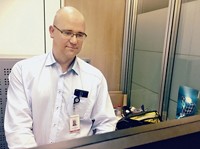Advertisement
Grab your lab coat. Let's get started
Welcome!
Welcome!
Create an account below to get 6 C&EN articles per month, receive newsletters and more - all free.
It seems this is your first time logging in online. Please enter the following information to continue.
As an ACS member you automatically get access to this site. All we need is few more details to create your reading experience.
Not you? Sign in with a different account.
Not you? Sign in with a different account.
ERROR 1
ERROR 1
ERROR 2
ERROR 2
ERROR 2
ERROR 2
ERROR 2
Password and Confirm password must match.
If you have an ACS member number, please enter it here so we can link this account to your membership. (optional)
ERROR 2
ACS values your privacy. By submitting your information, you are gaining access to C&EN and subscribing to our weekly newsletter. We use the information you provide to make your reading experience better, and we will never sell your data to third party members.
Business
Merck Seeds An Open Database With Computers And Data
by Rick Mullin
May 25, 2009
| A version of this story appeared in
Volume 87, Issue 21
Stephen Friend and Eric Schadt came to Merck & Co. in 2001 when the drug company purchased Rosetta Inpharmatics. They will be leaving this summer and taking with them a data-packed 10,000-processor computer cluster at Rosetta's facilities in Seattle.
COVER STORY
Merck Seeds An Open Database With Computers And Data
Friend and Schadt are launching Sage Bionetwork, an open-platform database for sharing and disseminating complex disease biology data. What's spurred them is the massive influx of biological data in drug research and the need for collaboration in understanding the biological mechanisms of disease. Sage is also intended to put biology on equal footing with chemistry in drug research, according to Friend, senior vice president and oncology franchise head at Merck Research Laboratories.
"In biology, unlike in chemistry where there are models, researchers make massive files of supplementary material," Friend says. Sage will establish a common platform for data based on shared models that reflect disease biology. The idea, he explains, is to foster experiments that enrich these models rather than repeat work already done elsewhere. Just as important, according to Friend, Sage will promote biological research as a collaborative enterprise.
"We are headed toward a clinical genomic Tower of Babel where people each have their own view of what's going on and can't talk to each other," Friend says. "The reason I am leaving Merck is that I fundamentally believe we need a different mechanism, a space between the private and public sectors that will reward people for sharing and that will make disease biology a precompetitive space."
According to Schadt, executive scientific director for genetics at Rosetta, establishing an open workspace for disease biology is important because understanding disease will require an enormous group effort. "In order to win in the drug discovery game down the road, you are absolutely going to have to be masters of all this information," Schadt says. "It's simply too much for any one company to do on its own."
The incentive for large companies to participate, he says, is likely to be the prohibitive cost of going it alone. "I think ultimately we are going to see that companies will not be able to afford computers as big as they need to get to informed decisions," Schadt says. Although cloud computing may offer a low cost way for individual drug firms to expand some computing functions, a wider pool of human resources will also be needed.
"The way to achieve this is by having an open-access enterprise that will not only host all of the data and build models for the data but that will also enable researchers around the world to interact with those data and refine the models," he contends.
Friend says Merck's willingness to share the data in Seattle with other research organizations by simply handing it over to Sage is an indication that large drug companies are becoming more willing to work collaboratively and are beginning to broaden the definition of public, precompetitive data. "I don't think the pharmaceutical industry is willing to share compound data," he says, "but it is willing to share disease biology data."
Sage intends to expand its data center through partnerships. Its first partner, the Fred Hutchinson/University of Washington Cancer Consortium, is local. But Schadt envisions partnerships worldwide. The group is in talks with the Wellcome Trust, in London, and with potential partners in China. Sage's tentative launch date is July 1.





Join the conversation
Contact the reporter
Submit a Letter to the Editor for publication
Engage with us on Twitter